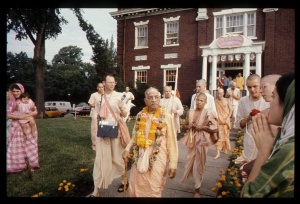SB 10.11.31-32: Difference between revisions
m (1 revision(s)) |
(Vanibot #0054 edit - transform synonyms into clickable links, which search similar occurrences) |
||
| (One intermediate revision by one other user not shown) | |||
| Line 1: | Line 1: | ||
{{info | {{info | ||
|speaker= | |speaker=Śukadeva Gosvāmī | ||
|listener=King | |listener=King Parīkṣit | ||
}} | }} | ||
[[Category:Srimad-Bhagavatam - Canto 10 Chapter 11]] | |||
[[Category:Bhagavatam Verses Spoken by Sukadeva Gosvami - Vanisource|101131]] | |||
<div style="float:left">'''[[Srimad-Bhagavatam]] - [[SB 10|Tenth Canto]] - [[SB 10.11: The Childhood Pastimes of Krsna|Chapter 11: The Childhood Pastimes of Kṛṣṇa]]'''</div> | |||
<div style="float:right">[[File:Go-previous.png|link=SB 10.11.30]] '''[[SB 10.11.30]] - [[SB 10.11.33]]''' [[File:Go-next.png|link=SB 10.11.33]]</div> | |||
{{RandomImage}} | |||
==== TEXTS 31-32 ==== | ==== TEXTS 31-32 ==== | ||
<div | <div class="verse"> | ||
vṛddhān bālān striyo rājan | :vṛddhān bālān striyo rājan | ||
sarvopakaraṇāni ca | :sarvopakaraṇāni ca | ||
anaḥsv āropya gopālā | :anaḥsv āropya gopālā | ||
yattā ātta-śarāsanāḥ | :yattā ātta-śarāsanāḥ | ||
godhanāni puraskṛtya | |||
śṛṅgāṇy āpūrya sarvataḥ | :godhanāni puraskṛtya | ||
tūrya-ghoṣeṇa mahatā | :śṛṅgāṇy āpūrya sarvataḥ | ||
yayuḥ saha-purohitāḥ | :tūrya-ghoṣeṇa mahatā | ||
:yayuḥ saha-purohitāḥ | |||
</div> | </div> | ||
| Line 21: | Line 27: | ||
==== SYNONYMS ==== | ==== SYNONYMS ==== | ||
<div | <div class="synonyms"> | ||
''[//vanipedia.org/wiki/Special:VaniSearch?s=vṛddhān&tab=syno_o&ds=1 vṛddhān]'' — first all the old men; ''[//vanipedia.org/wiki/Special:VaniSearch?s=bālān&tab=syno_o&ds=1 bālān]'' — children; ''[//vanipedia.org/wiki/Special:VaniSearch?s=striyaḥ&tab=syno_o&ds=1 striyaḥ]'' — women; ''[//vanipedia.org/wiki/Special:VaniSearch?s=rājan&tab=syno_o&ds=1 rājan]'' — O King Parīkṣit; ''[//vanipedia.org/wiki/Special:VaniSearch?s=sarva&tab=syno_o&ds=1 sarva]-[//vanipedia.org/wiki/Special:VaniSearch?s=upakaraṇāni&tab=syno_o&ds=1 upakaraṇāni] [//vanipedia.org/wiki/Special:VaniSearch?s=ca&tab=syno_o&ds=1 ca]'' — then all sorts of necessities and whatever belongings they had; ''[//vanipedia.org/wiki/Special:VaniSearch?s=anaḥsu&tab=syno_o&ds=1 anaḥsu]'' — on the bullock carts; ''[//vanipedia.org/wiki/Special:VaniSearch?s=āropya&tab=syno_o&ds=1 āropya]'' — keeping; ''[//vanipedia.org/wiki/Special:VaniSearch?s=gopālāḥ&tab=syno_o&ds=1 gopālāḥ]'' — all the cowherd men; ''[//vanipedia.org/wiki/Special:VaniSearch?s=yattāḥ&tab=syno_o&ds=1 yattāḥ]'' — with great care; ''[//vanipedia.org/wiki/Special:VaniSearch?s=ātta&tab=syno_o&ds=1 ātta]-[//vanipedia.org/wiki/Special:VaniSearch?s=śara&tab=syno_o&ds=1 śara]-[//vanipedia.org/wiki/Special:VaniSearch?s=asanāḥ&tab=syno_o&ds=1 asanāḥ]'' — fully equipped with arrows and bows; ''[//vanipedia.org/wiki/Special:VaniSearch?s=go&tab=syno_o&ds=1 go]-[//vanipedia.org/wiki/Special:VaniSearch?s=dhanāni&tab=syno_o&ds=1 dhanāni]'' — all the cows; ''[//vanipedia.org/wiki/Special:VaniSearch?s=puraskṛtya&tab=syno_o&ds=1 puraskṛtya]'' — keeping in front; ''[//vanipedia.org/wiki/Special:VaniSearch?s=śṛṅgāṇi&tab=syno_o&ds=1 śṛṅgāṇi]'' — bugles or horns; ''[//vanipedia.org/wiki/Special:VaniSearch?s=āpūrya&tab=syno_o&ds=1 āpūrya]'' — vibrating; ''[//vanipedia.org/wiki/Special:VaniSearch?s=sarvataḥ&tab=syno_o&ds=1 sarvataḥ]'' — all around; ''[//vanipedia.org/wiki/Special:VaniSearch?s=tūrya&tab=syno_o&ds=1 tūrya]-[//vanipedia.org/wiki/Special:VaniSearch?s=ghoṣeṇa&tab=syno_o&ds=1 ghoṣeṇa]'' — with the resounding of the bugles; ''[//vanipedia.org/wiki/Special:VaniSearch?s=mahatā&tab=syno_o&ds=1 mahatā]'' — loud; ''[//vanipedia.org/wiki/Special:VaniSearch?s=yayuḥ&tab=syno_o&ds=1 yayuḥ]'' — started; ''[//vanipedia.org/wiki/Special:VaniSearch?s=saha&tab=syno_o&ds=1 saha]-[//vanipedia.org/wiki/Special:VaniSearch?s=purohitāḥ&tab=syno_o&ds=1 purohitāḥ]'' — with the priests. | |||
</div> | </div> | ||
| Line 28: | Line 34: | ||
==== TRANSLATION ==== | ==== TRANSLATION ==== | ||
<div | <div class="translation"> | ||
Keeping all the old men, women, children and household paraphernalia on the bullock carts and keeping all the cows in front, the cowherd men picked up their bows and arrows with great care and sounded bugles made of horn. O King Parīkṣit, in this way, with bugles vibrating all around, the cowherd men, accompanied by their priests, began their journey. | Keeping all the old men, women, children and household paraphernalia on the bullock carts and keeping all the cows in front, the cowherd men picked up their bows and arrows with great care and sounded bugles made of horn. O King Parīkṣit, in this way, with bugles vibrating all around, the cowherd men, accompanied by their priests, began their journey. | ||
</div> | </div> | ||
| Line 35: | Line 41: | ||
==== PURPORT ==== | ==== PURPORT ==== | ||
<div | <div class="purport"> | ||
In this connection it is to be noted that although the inhabitants of Gokula were mostly cowherd men and cultivators, they knew how to defend themselves from danger and how to give protection to the women, the old men, the cows and the children, as well as to the brahminical purohitas. | In this connection it is to be noted that although the inhabitants of Gokula were mostly cowherd men and cultivators, they knew how to defend themselves from danger and how to give protection to the women, the old men, the cows and the children, as well as to the brahminical ''purohitas''. | ||
</div> | </div> | ||
__NOTOC__ | |||
<div style="float:right; clear:both;">[[File:Go-previous.png|link=SB 10.11.30]] '''[[SB 10.11.30]] - [[SB 10.11.33]]''' [[File:Go-next.png|link=SB 10.11.33]]</div> | |||
__NOTOC__ | |||
__NOEDITSECTION__ | |||
Latest revision as of 18:21, 17 February 2024

A.C. Bhaktivedanta Swami Prabhupada
TEXTS 31-32
- vṛddhān bālān striyo rājan
- sarvopakaraṇāni ca
- anaḥsv āropya gopālā
- yattā ātta-śarāsanāḥ
- godhanāni puraskṛtya
- śṛṅgāṇy āpūrya sarvataḥ
- tūrya-ghoṣeṇa mahatā
- yayuḥ saha-purohitāḥ
SYNONYMS
vṛddhān — first all the old men; bālān — children; striyaḥ — women; rājan — O King Parīkṣit; sarva-upakaraṇāni ca — then all sorts of necessities and whatever belongings they had; anaḥsu — on the bullock carts; āropya — keeping; gopālāḥ — all the cowherd men; yattāḥ — with great care; ātta-śara-asanāḥ — fully equipped with arrows and bows; go-dhanāni — all the cows; puraskṛtya — keeping in front; śṛṅgāṇi — bugles or horns; āpūrya — vibrating; sarvataḥ — all around; tūrya-ghoṣeṇa — with the resounding of the bugles; mahatā — loud; yayuḥ — started; saha-purohitāḥ — with the priests.
TRANSLATION
Keeping all the old men, women, children and household paraphernalia on the bullock carts and keeping all the cows in front, the cowherd men picked up their bows and arrows with great care and sounded bugles made of horn. O King Parīkṣit, in this way, with bugles vibrating all around, the cowherd men, accompanied by their priests, began their journey.
PURPORT
In this connection it is to be noted that although the inhabitants of Gokula were mostly cowherd men and cultivators, they knew how to defend themselves from danger and how to give protection to the women, the old men, the cows and the children, as well as to the brahminical purohitas.